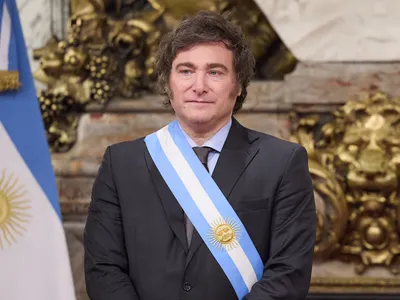Argentine President Javier Milei has dismissed investor demands to allow the peso to float freely, insisting he will stick to his government’s managed exchange rate policy despite mounting pressure from markets.
Fresh from his party’s strong performance in midterm elections, the libertarian leader said his administration would continue to guide the peso within widening trading bands against the U.S. dollar until at least 2027. Milei argued that the approach is crucial to stabilizing Argentina’s volatile economy and rebuilding investor confidence.
“We have a program and we are going to maintain it,” Milei told the Financial Times, rejecting claims that the current system has led to an overvalued currency.
US Support
The remarks came after reports that the U.S. Treasury spent about $2 billion last month to support the peso as it came under attack during Argentina’s election period. Washington also announced a $20 billion credit line to help shore up the country’s reserves.
U.S. Treasury Secretary Scott Bessent described the move as part of a new “economic Monroe Doctrine,” aimed at reasserting U.S. influence in Latin America and countering China’s growing presence.
Milei praised the policy shift, saying, “The U.S. has openly decided to be the leader of the region, and I strongly celebrate that.”
He also reaffirmed his close ties with former U.S. President Donald Trump, voicing support for Washington’s recent military operations against drug traffickers in the Caribbean and its hardline stance on Venezuelan president Nicolás Maduro, whom he labeled a “narco-dictator.”
Argentina Economic Growth
Milei said Argentina’s improving financial indicators following his electoral win showed that his strategy was working. The peso has strengthened since the vote, while optimism has grown that Argentina could return to global credit markets as early as next year.
“I think in 2026 Argentina will be in the market,” Milei said, adding that the U.S. swap line would secure the nation’s liquidity and ensure it meets debt obligations. “Argentina will not default. Our commitment to paying our debts is unbreakable.”
The president outlined plans for sweeping tax and labor reforms aimed at reviving growth. His government hopes to cut public spending from 42% to 25% of GDP, eliminate 20 taxes, and put an estimated $500 billion back into citizens’ pockets by 2031. Milei predicted the economy could expand between 7% and 10% annually from next year if reforms pass.
However, Milei faces political challenges in Congress, where his La Libertad Avanza party lacks a majority. The recent resignation of cabinet chief Guillermo Francos, a key political negotiator, has raised concerns among investors. His replacement, Interior Minister Diego Santilli, is expected to take a more conciliatory approach with provincial governors and opposition blocs.
Despite these hurdles, Milei said he remains determined to “fire up all the growth engines” and continue cutting government bureaucracy. With his signature bronze chainsaw displayed in his office — a symbol of his campaign promise to “cut down the state” — Milei pledged further austerity measures to reshape Argentina’s economy.
“In this world order, the United States understands that its bloc is in the Americas,” he said. “And without doubt, we are its biggest strategic ally.”

